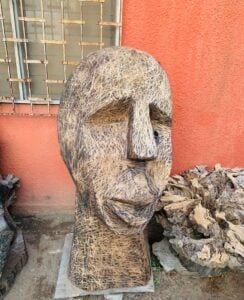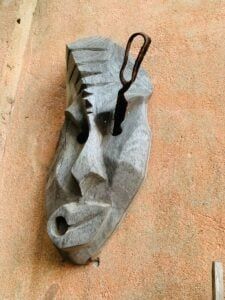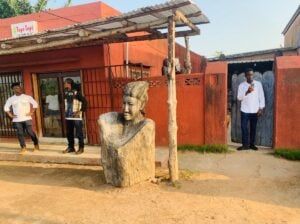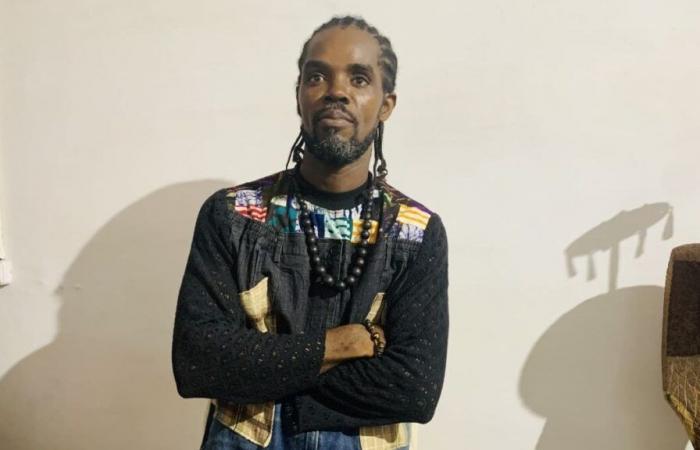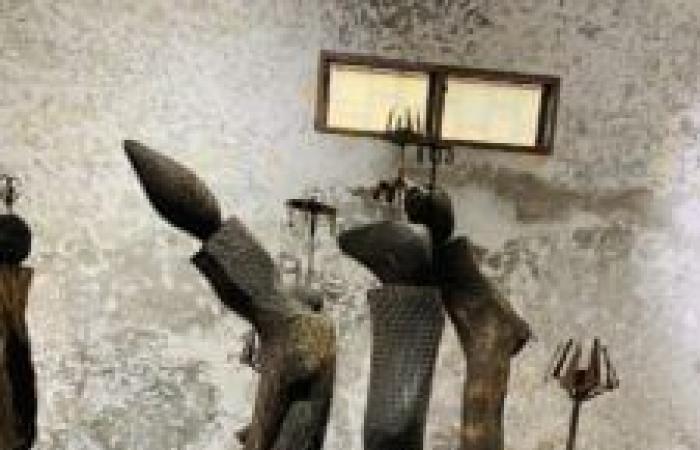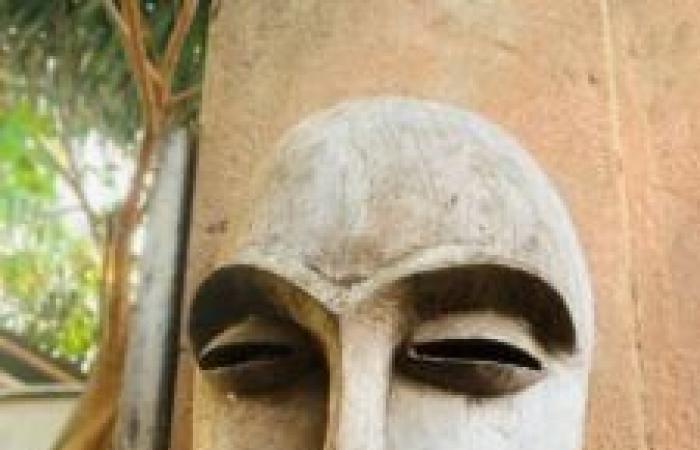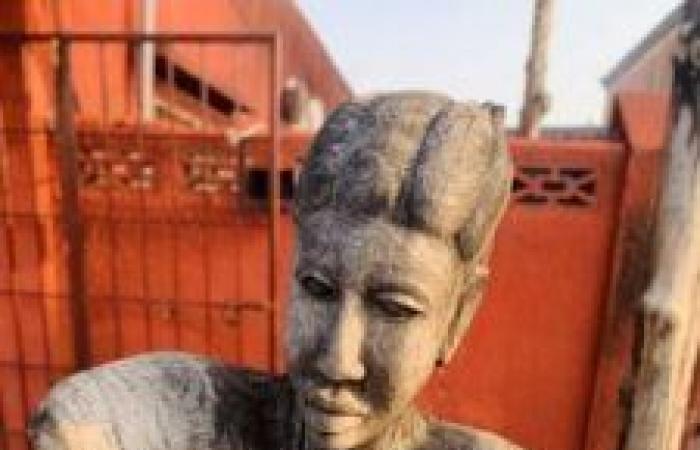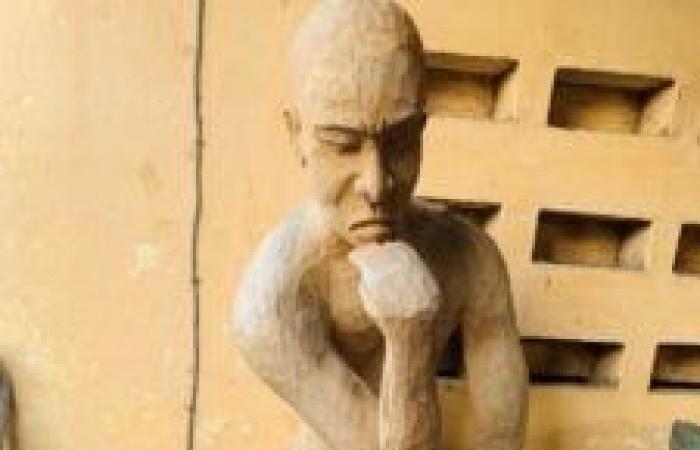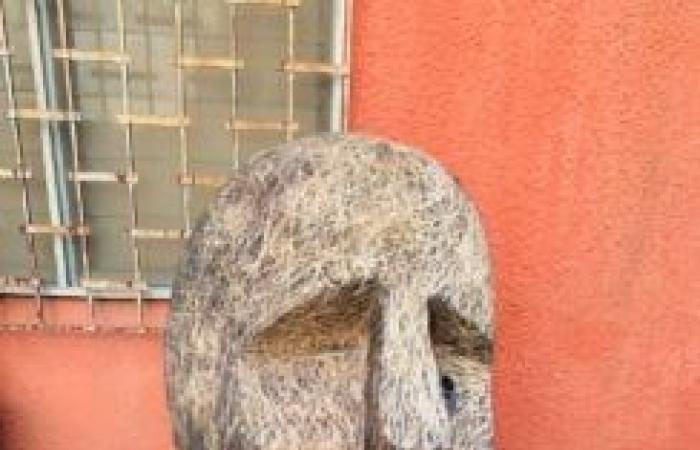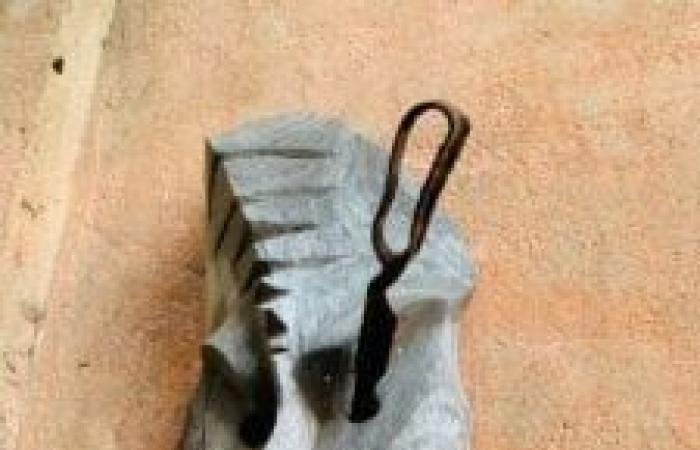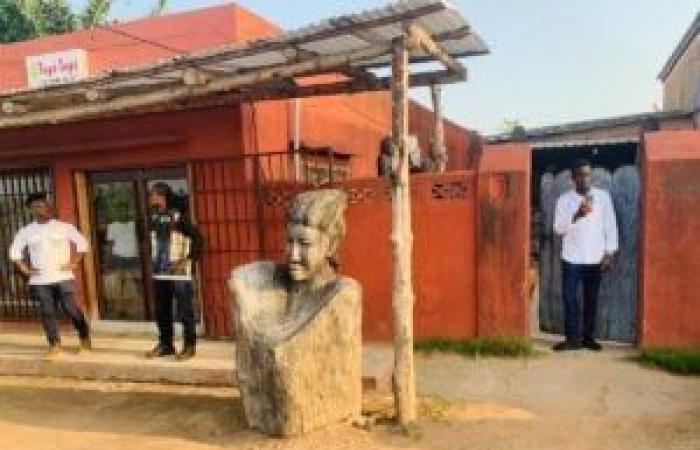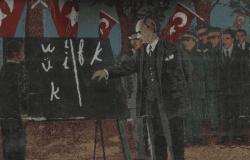Dodji Kwami Abgetoglo, renowned sculptor and proud ambassador of Togo on the international scene, has transformed his passion for wood into a true art, combining tradition and respect for the environment. Encounter !
It is 4:30 p.m. in Lomé, the political capital of Togo. This November 14, the sun lights up the city with all its rays when we go to the Togolese artist’s studio. “Tayé Tayé” is the name of his laboratory located on Avenue Gulasamée, on the outskirts of Lomé. The sculptor lives on this main road, and it is impossible not to recognize his workshop. At the entrance to his house, his works of art welcome visitors.
As soon as we approach, a sculpture representing the bust of a woman with an afro hairstyle, placed in front of the door, gives us a first glimpse of the artist’s creative universe. As soon as we arrive, Mr. Kwami welcomes us warmly, with a handshake and a friendly smile. “Welcome to our home,” he tells us, proud to share his artistic world. And so the visit begins…
A workshop and a place of learning
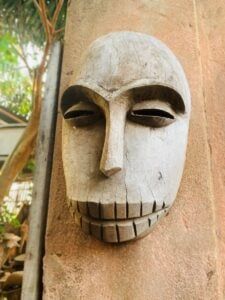 Once inside his studio, it becomes clear that this internationally renowned artist fully embodies a new generation of African artists, where nature takes center stage. Deeply anchored in the traditions of his country while being resolutely turned towards the future, he brings dead wood back to life and demonstrates, through his work, the impact of art in the service of the environment and the transmission of cultural values. Mr. Dodji does not work in isolation. His workshop is also a place of meeting and learning, where 15 people work alongside him. They sculpt, but also make fabrics and paintings.
Once inside his studio, it becomes clear that this internationally renowned artist fully embodies a new generation of African artists, where nature takes center stage. Deeply anchored in the traditions of his country while being resolutely turned towards the future, he brings dead wood back to life and demonstrates, through his work, the impact of art in the service of the environment and the transmission of cultural values. Mr. Dodji does not work in isolation. His workshop is also a place of meeting and learning, where 15 people work alongside him. They sculpt, but also make fabrics and paintings.
Sculpture, a family and spiritual art
It is since his childhood that Dodji Kwami Abgetoglo has immersed himself in an environment rich in traditions. “Sculpture was not part of my childhood dreams,” says the artist with an afro hairstyle. Turning to this field of art is not a coincidence for him. Indeed, in his family, the art of wood is a generational affair. Originally from Benin, his family is made up of hunters and artisans, a heritage which, without him knowing it at the time, would guide him towards his vocation.
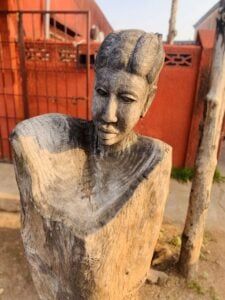 “I didn’t choose to be a sculptor. Since my childhood, through traditional consultations, I understood that wood and I were linked. In my family, we have always had a deep relationship with nature, particularly through hunting and crafts,” he confides with obvious conviction. This ancestral relationship with the forest and the wood is for him a continuous dialogue and a true spiritual exchange with nature.
“I didn’t choose to be a sculptor. Since my childhood, through traditional consultations, I understood that wood and I were linked. In my family, we have always had a deep relationship with nature, particularly through hunting and crafts,” he confides with obvious conviction. This ancestral relationship with the forest and the wood is for him a continuous dialogue and a true spiritual exchange with nature.
Sculpture and environmental protection
This respect for nature is reflected in the way Dodji works with wood. Unlike many artisans, he does not cut down trees for his art. “I respect the forest, I don’t destroy it,” he insists. The majority of the wood he uses comes from construction sites where trees have been felled. “When people build roads, I collect unused wood to give them a second life.” His eco-responsible approach led him, in 2019, to travel to China, where he learned to work with deadwood and driftwood. This experience was a turning point, because it allowed him to give a new dimension to his work, using often neglected materials to transform them into true masterpieces.
Sculpture and communication
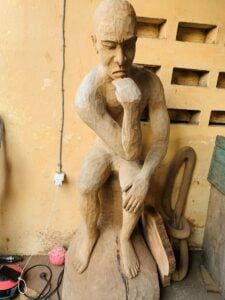 For Mr. Dodji, each piece of wood is unique and each sculpture is the result of an intimate dialogue between him and the material. “When you are the father of a family, it is not easy to say that I love one child more than another. It’s the same with the woods. Every type of wood, every sculpture you see here, it’s a direct conversation I have with them,” he explains. His artistic approach is deeply spiritual. He talks about the different types of wood he uses, such as mahogany, acacia, iroko, lenge, and teke, to name just a few. Each wood he uses has “a particular meaning and echoes the traditions of his country and the West African region,” he notes.
For Mr. Dodji, each piece of wood is unique and each sculpture is the result of an intimate dialogue between him and the material. “When you are the father of a family, it is not easy to say that I love one child more than another. It’s the same with the woods. Every type of wood, every sculpture you see here, it’s a direct conversation I have with them,” he explains. His artistic approach is deeply spiritual. He talks about the different types of wood he uses, such as mahogany, acacia, iroko, lenge, and teke, to name just a few. Each wood he uses has “a particular meaning and echoes the traditions of his country and the West African region,” he notes.
The transmission of cultural values
Dodji Kwami Abgetoglo’s work is not only aesthetic. It also carries a powerful message, that of the preservation of African traditions and values. A good approach in our societies which tend to lose their cultural identities. Through his sculptures, he seeks to perpetuate ancestral cultural practices, among others, family solidarity, cultural unity and love of neighbor.
“My work is a way of keeping alive the values that have spanned the ages. I want to show through art that unity is our strength, that love of family and community is essential,” he emphasizes. The values he preaches are not just limited to his art. At the end of our open-hearted exchange, the artist offered us a dish and a glass of water; a gesture full of meaning in terms of hospitality and humanism.
